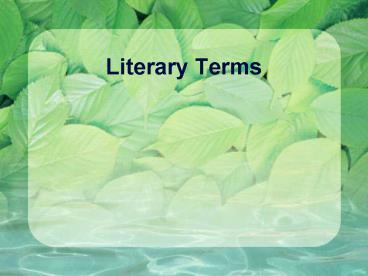Literary Terms - PowerPoint PPT Presentation
1 / 14
Title:
Literary Terms
Description:
Literary Terms Characters Round Well developed Many traits, both good and bad Realistic and life-like Usually main characters Flat Not well developed Not many traits ... – PowerPoint PPT presentation
Number of Views:88
Avg rating:3.0/5.0
Title: Literary Terms
1
Literary Terms
2
Characters
- Round
- Well developed
- Many traits, both good and bad
- Realistic and life-like
- Usually main characters
- Flat
- Not well developed
- Not many traits
- Sometimes stereotyped
- Usually minor characters
3
Characters
- Dynamic
- Undergoes important personality changes
throughout the story - A change occurs in the character because of the
events of the story - Static
- Remains the same throughout the story
- Although something may happen to the character in
the story, it does not change the character
4
Characters
- Protagonist
- Central character
- Pushes action forward and attempts to accomplish
something - Usually a good person or the hero
- Usually round and dynamic
- Antagonist
- Character that holds the action back
- Character who is usually against the protagonist
- Foil
- Secondary or minor character
- Opposite of the protagonist but usually
highlights the traits of the protagonist
5
Setting
- Time
- Place
- Environment
- Mood
6
Theme
- Lesson or Moral
- What lesson does the author want you to learn
from it? - Raises a question about human nature
- Central Idea
- What does it communicate about life?
- Expresses the authors opinion
7
Conflict
- External
- Person vs. Nature
- Person vs. Person
- Person vs. Society
- Internal
- Person vs. Self
8
Plot
- A series of related events, each event connected
to the next, like links in a chain.
9
Flashback
- A scene that interrupts the story to introduce an
event that took place in the past.
10
Flash-forward
- A scene that jumps ahead of the story to narrate
and event that happens in the future.
11
Foreshadowing
- Hints in the story that certain events are going
to happen later.
12
Suspense
- The excitement and tension that builds up in a
story, which makes readers curious to find out
how the story ends.
13
Climax
- The most exciting part of the story - the moment
when the outcome of the conflict is determined.
The climax usually occurs near the end of a short
story.
14
Allegory
- A work of literature in which characters and
places stand for abstract qualities, usually
virtues and vices. - Sometimes the characters and places in an
allegory have names that describe what they
symbolize, such as a character called Mr. Mean
and a place called Sea of Troubles.

